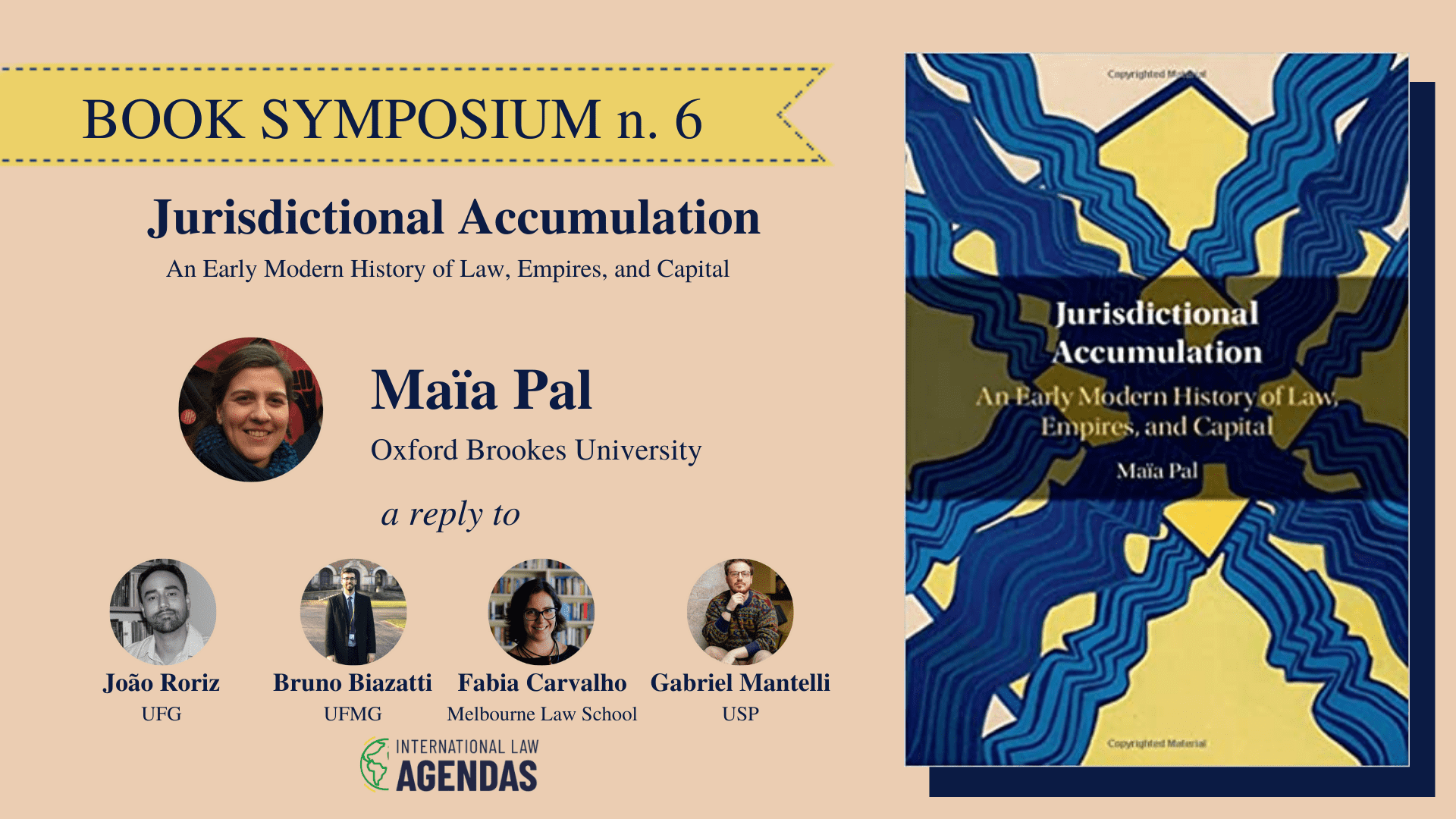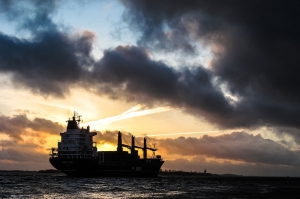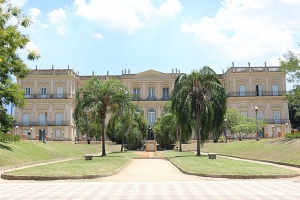Reading one’s work through the eyes of others is as sobering as it is intoxicating. I am deeply grateful for the contributions of the four brilliant scholars that participated in this symposium. Their generous thoughts on what was achieved in the pages of my book, as well as their insightful and pertinent suggestions and comments on its blind spots will stay with me in the months and years to come, as I develop and dig deeper into the implications and potential applications of the concept of jurisdictional accumulation.
Developing a new concept to understand three hundred years of multi-layered, bloody, and already overanalysed European imperial histories was a gamble which I continue to question and openly think about. Mantelli’s piece raises crucial issues of language, knowledge production, and audience restrictions which were regular bedfellows to my own anxieties, as I worked my way through developing the specific narrative of how certain actors innovated jurisdictionally in ways that furthered the imperial expansion of their sovereigns. This narrative was inevitably structured by my own ‘imperiality’ or ‘imperialness’ (imperialidade), by the structures of the institutions and writing standards that are imposed on us and that we self-reproduce when writing in and from Western Europe.
In effect, the project explicitly grew out of me as a young French-English bilingual woman obsessed with, and disgusted by, the orgy of imperial symbolism and pride of both societies in which I grew up, never sure if it was better to cling on to a French or British identity to try and salvage some kind of worthwhile political truth or project, or just give up on whatever these political contexts gave me. Was there anything in the legal systems that emerged out of French and British colonial projects, as languages and systems that came to dominate so many others, that one could legitimately pursue and use for more radical and subversive objectives? In other words, was it possible and desirable to write a critical history of French and British legal expansion through the language, format, and structure – as well as from the comfort – of institutions that provided me, through their colonial privilege and authority, with the space to do so?
The reality of everyday work as a teaching academic in a typical Western European neoliberal university meant that these questions had to be left aside to some extent. I pursued the project, not because I was certain of its ability to analytically transcend these colonial ‘frontiers’, and thus achieve a decolonised project that was able to speak ‘globally’, but because it was the only way I could fashion to push against those frontiers. These thoughts are not an excuse nor explanation for the problems raised by decolonial and postcolonial theories, but I mention them because they illustrate some of the more political and discursive arguments implicitly made in the book. In other words, the analytical project of the book reflects and tries to navigate a way for my own personal trajectories and dilemmas in knowing how, and to whom, I can and should speak.
First, jurisdictional accumulation was a way to go deep into the intricacies and intermingled web of the jurisdictional colonisations that surrounded me as I grew up in a region of the South of France where imperial racism remains strongly experienced by descendants of colonised peoples. Mantelli’s point about touching on the ‘internal colonialism of colonised territories’ is much appreciated, because it also speaks to a reality for certain people – e.g. second or third generation migrants in France – not white enough to be accepted as ‘French’ today, and for others whose more local cultures and languages (e.g. Provençal language and culture) were erased by the French state. French colonialism needed to assert itself in the metropolitan regions too, although whether the term ‘colonialism’ is appropriate here is a separate debate. Second, jurisdictional accumulation was a heuristic tool to help me make sense, as a Marxist, of how one, like myself, is part of a hegemonic, privileged, Eurocentric culture that continues to dispossess globally, while also being alienated and subjugated by a commodified labour regime in which I need to survive. This dilemma is also at the heart of how we should theorise law in a capitalist system. Whether as ‘strategic opportunists’, critical historians and sociologists, or radical re-drafters of new languages of power and resistance, we are all, it seems, trapped in various jurisdictional webs of accumulation, that we choose, for methodological reasons, to either disentangle from various micro-perspectives or appreciate dialectically from a macro-position.
Each contributor perceived useful aspects and problems with this ambitious attempt to provide an analytic overview of four major empires over three hundred years of history. They sharply summarised the book’s achievements as revealing the ‘events that pass by’ or the ‘undergarments of the cover of legality’ and the ways that even those ‘from above’ can be rendered invisible, as breaking ‘up the historical link between jurisdiction and sovereignty’, and as providing specificity and agency to otherwise determinist and over-simplified Marxist histories of colonialism and imperialism, the ‘golden jurisdiction’ that contests the ‘original sin’ of certain, even critical, historiographies.
Crucially, the contributors also raise significant points which will deserve further analysis. Mantelli laments the lack of discussion of post- and decolonial scholars, whose influence on critical international law certainly deserves a more thorough engagement. Forthcoming scholarship by Dutra Salgado discusses the links between recent decolonial authors and Political Marxism by focusing on each approach’s emphasis on agency. Dutra Salgado’s previous work (here and here) also echoes Carvalho’s fascinating account of Caio Prado’s legacy, which illustrates some of the issues with versions of Marxist historiography that today seem limited for the work that needs doing on Latin American development. Furthermore, BS Chimni’s forthcoming attempts to also use jurisdiction to bridge arguments of TWAIL and Marxist theory provide grounds to better think through the links between critical approaches. More empirically, if I lament the reasons why it was not possible to deal with the Portuguese empire in this work, all contributors have given me significant resources and ideas to further develop the application of the book to these contexts in the future, and I am deeply grateful for those.
Especially, Roriz’s suggestion to turn the tables around and question how the argument stands when faced with the ‘reaction to jurisdictional accumulation practices’ is without a doubt a necessary next step for continuing this work. Is jurisdictional accumulation malleable enough to be turned around, and to reflect how imperialism ‘was received and maybe even resisted’? The suggestion also speaks to Mantelli’s frustrations with ‘not belonging’ or ‘not being part of the conversation’, but also perhaps with Biazatti’s extremely careful and detailed critique which puts the finger on the central weakness of the work, i.e. its ‘overreach’ and ‘over-inclusiveness’. Much remains to be done, through primary and secondary research, to ascertain the actual long-term reach and potential of the concept of jurisdictional accumulation. But one crucial limitation is that the aim is not to produce a universal theoretical lens that could be applied ahistorically. The concept emerged out of a specific context, and if it can be tested against other cases, it should not be used a priori to explain or illustrate others without careful historicisation. Thus, clarifying and perhaps limiting its reach is an important task, though I hope it will also lead to the main objective of showing how jurisdiction is a standalone political and economic process that needs to be given a more independent analytical purchase in histories of law and international relations.
Moreover, specific questions concerning the role of consuls could open fruitful new pathways. However, consuls developed into quite different institutions in the nineteenth-century cases raised by Biazatti, and I would for now maintain that the jurisdictional accumulation by which they were driven in the early modern period was specific to the geopolitical conditions of that time. The point about the role of women is absolutely right, and provides a much-needed critical perspective on what is considered legitimate diplomacy and forms of accumulation, too often assumed to be driven by the ‘foreground of empires’ i.e. the usual suspects such as ‘kings, state ministries’ and ambassadors. The book goes some way into addressing this problem by looking at more ‘private’ actors, but this point requires further work. Koskenniemi’s forthcoming book will definitely offer useful points of comparison. Finally, the macro-sociological argument about the class geopolitics and aristocratisation of eighteenth-century ambassadors, also raised by Biazatti, undoubtedly deserves further study, though answering these questions is often limited by archival obstacles. Nevertheless, they also open a new approach to rethink the evolution of these key actors in their larger context, which will inevitably enrich histories of international law and international relations.
-

Oxford Brookes University. Senior Lecturer in International Relations. School of Social Sciences. Faculty of Humanities and Social Sciences





